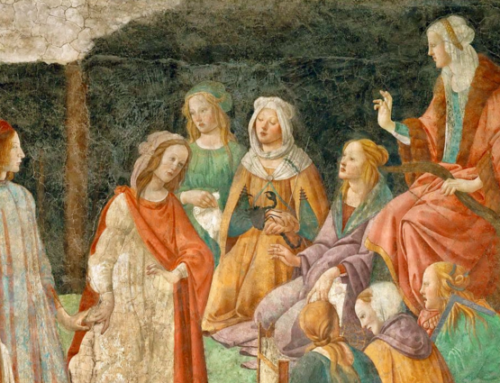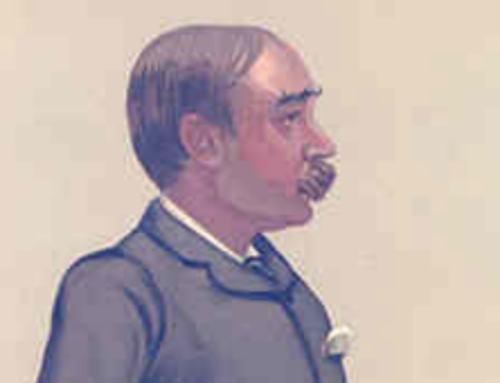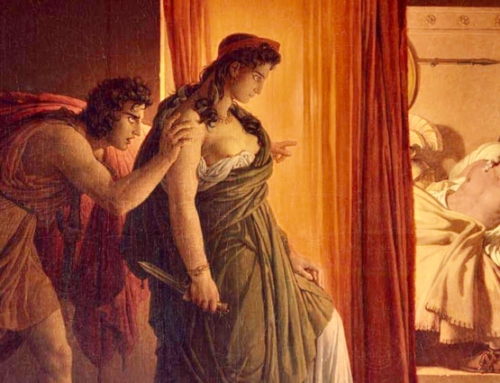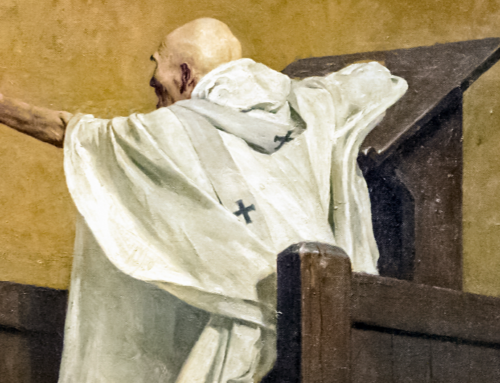Sohrab Ahmari’s book, “The Unbroken Thread: Discovering the Wisdom of Tradition in an Age of Chaos,” makes the sustained case that too much freedom—or rather, too much of the wrong sort of freedom—can be a kind of slavery.
The Unbroken Thread: Discovering the Wisdom of Tradition in an Age of Chaos by Sohrab Ahmari (320 pages, Convergent Books, 2021)
“Each move is dictated by the previous one—that is the meaning of order.” ―Tom Stoppard, Rosencrantz and Guildenstern Are Dead
 In the West, we trust George Orwell implicitly. He is the great prophet of our age. When he holds up the Party mantra “Freedom is Slavery” as an example of naked doublethink, we thus accept the proposition with hardly a second thought. But is it? Sohrab Ahmari’s latest book The Unbroken Thread: Discovering the Wisdom of Tradition in an Age of Chaos makes the sustained case that too much freedom—or rather, too much of the wrong sort of freedom—can be a kind of slavery.
In the West, we trust George Orwell implicitly. He is the great prophet of our age. When he holds up the Party mantra “Freedom is Slavery” as an example of naked doublethink, we thus accept the proposition with hardly a second thought. But is it? Sohrab Ahmari’s latest book The Unbroken Thread: Discovering the Wisdom of Tradition in an Age of Chaos makes the sustained case that too much freedom—or rather, too much of the wrong sort of freedom—can be a kind of slavery.
Informed by enlightenment liberal assumptions, the Western vision of freedom adheres closely to John Stuart Mill’s maxim that liberty “consists in the freedom to do everything which injures no one else.” Mr. Ahmari, an emigrant from Iran, understands the lure of this kind of freedom better than most. As a teenager, the author explains, “I blamed all that ailed my native land, its repressiveness and the double-thinking and double-living it engendered, on our hidebound traditions.” The negative rights regime of the United States, by contrast, with its value-neutral public square and insistence on individual autonomy as an end in itself, promised social, sexual, and economic liberation, as well as limitless choice.
Mr. Ahmari describes the exhilaration of arriving in the United States and participating in the theatre of expressive individualism that our culture encourages. “My moral opinions were as interchangeable as my clothing styles and musical tastes,” he writes. “I could pick up and drop this ideology or that. I could be a high-school ‘goth,’ a college socialist, a law-school neoconservative. I could dabble in drugs and build an identity around my dabbling. I could get a girlfriend, cheat on her, dump her… and build a pseudo-identity around that, too. All along, it outraged me to recall that there were people still trapped in societies that didn’t permit such experiments in individual self-definition.”
At the age of 31, on his way to becoming a father, something shifted. No longer the unmoored libertine he once was, Mr. Ahmari began to question the Lockean dogmas of the West. The American legal tradition, with its noble procedural ideals and concern for individual rights, has done much to guard against tyranny and provide opportunity for the entrepreneurially minded. But has it produced a more virtuous citizenry? Do the “autonomy-maximizing norms” and “dizzying legal freedoms” enshrined by modern liberal regimes enable—or better still, encourage—ordinary people to pursue lives of meaning and purpose? “What kind of man,” the author wonders, “will contemporary Western culture chisel out of my son?” These are the questions that lie at the heart of The Unbroken Thread.
The book begins with the story of two Maximilians—the first being St. Maximilian Kolbe, a Polish Catholic priest who calmly sacrificed his life for another man at Auschwitz, opting to die of starvation so that another might live. For Mr. Ahmari, Kolbe’s death represents “the summit of human freedom.” Beyond being deeply moving, Kolbe’s story reminds us that true freedom is not about having the license to do what feels right, but the strength to do what is right. This is what Rabbi Joshua Heschel calls “inner liberty.” Freedom is not doing what one wants; it is doing what one ought. “[N]ailed to the cross, [Father Kolbe] told his captors, in effect: I’m freer than you.” The second Maximilian is Mr. Ahmari’s own son, who he worries—rather neurotically—will grow up to be a soulless, credentialled elite, the product of his culture, obsessed with keeping up and fitting in, impoverished not in the material but in the moral and spiritual sense. Which Maximilian is more free? The Auschwitz prisoner awaiting his sure death or the urbane, educated young man with every choice at his fingertips?
This juxtaposition between the priest and his namesake, between the two dueling notions of freedom, traditional and modern, animates the chapters that follow. Possibly hoping to capitalize on Jordan Peterson’s successful formula in Twelve Rules For Life, Mr. Ahmari gives readers twelve life-questions to chew on, each of which punctures a prominent but under-examined liberal assumption. Some chapters are more effective than others, though not a single one proved a chore to read. This is because The Unbroken Thread is not a polemic; it is an intellectual journey told as a series of cozy, fireside chats. That is not to say the book is not challenging or didactic, only that it satisfies what the late critic Harold Bloom considered the reader’s strongest, most authentic motive: “the search for a difficult pleasure.”
According to Elie Wiesel, “Man comes closer to God through the questions he asks Him,” even if he cannot understand His replies. The questions Mr. Ahmari explores are existential and theological: for instance, “Can You Be Spiritual without Being Religious?” and “Should You Think for Yourself?” and “Is Sex a Private Matter?” Chapter twelve, “What’s Good about Death?,” provides a defense of stoicism through the figure of Seneca. After excoriating modernity for its obsession with conquering death biotechnologically instead of reckoning with it, Mr. Ahmari declares, “To try desperately to defer death bespeaks a kind of arrogance, an undemocratic spirit, a refusal to join the great human throngs.” Each chapter pairs a broader philosophical meditation with a brief biographical sketch.
 “Chapter One: How Do You Justify Your Life?,” for example, argues that the truth cannot be subsumed by facts alone and that science must be squared with the moral law. Mr. Ahmari cites the crimes of Nazi doctors; the eugenic schemes of “humanist” philosophers, like J.B.S. Haldane and Bertrand Russell; and the social Darwinism of American progressives, like Earnest Hooton and Clarence Darrow. History is replete with examples of what happens when science is untethered to morality. The most fascinating aspect of this chapter is the biographical sketch of C.S. Lewis, who came, over the course of his life, to see radical materialism as incomplete and a “narrowly scientific-technical way of knowing the world” as dangerous. This prompted Lewis to pen his 1938 science fiction classic Out of the Silent Planet, whose villain, Weston, is an amoral utopian scientist who derides “classics and history and such trash” and dreams of colonizing other planets and eradicating their lifeforms in the name of progress.
“Chapter One: How Do You Justify Your Life?,” for example, argues that the truth cannot be subsumed by facts alone and that science must be squared with the moral law. Mr. Ahmari cites the crimes of Nazi doctors; the eugenic schemes of “humanist” philosophers, like J.B.S. Haldane and Bertrand Russell; and the social Darwinism of American progressives, like Earnest Hooton and Clarence Darrow. History is replete with examples of what happens when science is untethered to morality. The most fascinating aspect of this chapter is the biographical sketch of C.S. Lewis, who came, over the course of his life, to see radical materialism as incomplete and a “narrowly scientific-technical way of knowing the world” as dangerous. This prompted Lewis to pen his 1938 science fiction classic Out of the Silent Planet, whose villain, Weston, is an amoral utopian scientist who derides “classics and history and such trash” and dreams of colonizing other planets and eradicating their lifeforms in the name of progress.
Mr. Ahmari occasionally oversells his hand. Chapter one is a good example of this. When the author argues that there are different types of truths, he is undoubtedly correct. Any decent philosopher can tell you this. A work of fiction can be entirely made up, while still being true in the moral or pragmatic sense. There are a priori truths, truths of the natural sciences, “anthropocentric truths” (i.e., truths that are true because of the kinds of creatures we are), and even subjective feelings or preferences (i.e., truths that are true but only for you). It is also correct to say that reason and science have their limitations. But Mr. Ahmari goes too far—indeed, he sounds almost like a postmodernist—when he claims “the modern scientific outlook is a barbarous enterprise” that “tears down traditional knowledge” and “dismisses subjective ways of knowing.”
The biographical sketches—which include such giants as Augustine, Thomas Aquinas, Seneca, Rabbi Joshua Heschel, Aleksandr Solzhenitsyn, Cardinal John Henry Newman, and, surprisingly, Andrea Dworkin—are beautifully written and may, in the end, be the most satisfying element of the book. As a social critic, Mr. Ahmari is at his best when he takes aim at liquid modernity and advocates for a substantive re-engagement with the great books, ideas, and religious traditions of the West. The following is one such example:
Modern people go about their lives… ceaseless change and discontinuity are part of the routine. Fashions come and go. Ideas suddenly take hold of society, are forgotten, resurrected, and forgotten again. The market conjures and fulfills previously unimagined desires, until still-newer desires supplant the old. Imposing structures of glass and steel replace marble and brick. The natural world likewise appears pliant…. The dire message is the same: The realm of progress can’t fulfill our soul yearnings or satisfy our urge to put ourselves right with the sacred. In vain we seek substitutes for that ‘firm program’ of the past. We idolize politics and politicians, indulge in drugs or consumer extravagance, try out do-it-yourself spiritualities, and seek meaning and community online. Even if these balms temporarily assuage the pain, the wounds don’t heal. We can’t integrate our own lives without a vision of the whole that has endured the test of time: precisely what the great traditions promise.
Although each chapter offers its own unique and self-contained meditation, the entire book is a blistering critique of the liberal anti-culture and its shallow offerings. When I asked Mr. Ahmari about this, he told me: “Each of the chapters end up having the same theme, ultimately, which is that things that appear to limit us, bind us, set up barriers before our will, are actually sources of liberation; whereas, things that seem to be liberating us by demolishing those barriers… actually make us less free. True freedom,” he reminded me, “is found in limits.”
The idea that freedom resides in the cultivation of virtue finds its source in both Athens and Jerusalem. It is no wonder, then, that the modern West, as it turns its back on classical learning and Judeo-Christian faith, has rendered this view of freedom broadly unpopular, especially among young people. At the same time, the book never takes a resentful or angry tone. There is an immense gratitude, a sincere appreciation for the gifts of Western culture, along with a sense of unfeigned humility, to be found on every page. “An immigrant,” writes Mr. Ahmari in the introduction, “isn’t supposed to complain about the society that gave him refuge.”
The book ends on a humble note as well. Coming full circle, the author closes with a letter to his son, Maximilian. The note is brief, but the love mixed with anxiety is palpable. “I want you in every way to be a better man than I am,” the author tells his son. The letter is also rich with wisdom, such as “read old books before new ones” and “at least notice and feel a little bad when you find yourself acting like a hypocrite.” Whether he realizes it or not, Mr. Ahmari has written a book that is as much concerned with the future as it is with the past.
This essay was first published here in May 2021.
The Imaginative Conservative applies the principle of appreciation to the discussion of culture and politics—we approach dialogue with magnanimity rather than with mere civility. Will you help us remain a refreshing oasis in the increasingly contentious arena of modern discourse? Please consider donating now.
The featured image is courtesy of Pixabay.







Traditionalism is the true next great frontier for humanity because –among other things– it has to do with the human soul. And the human soul is on the chopping block– it is the object of the high tech guillotine that is closing in on us. . Some good traditionalists to read— Rene Guenon, Seyyed Hussein Nasr….